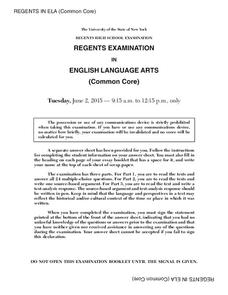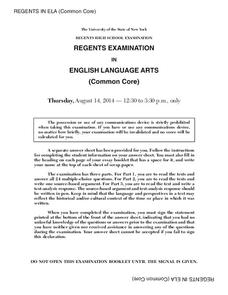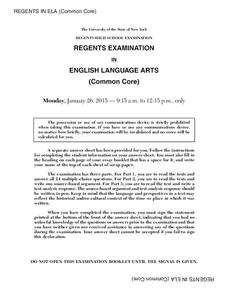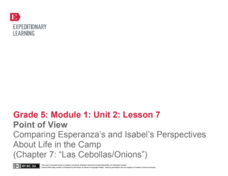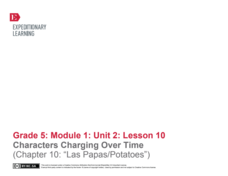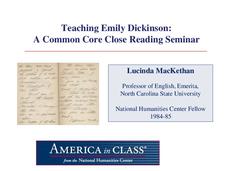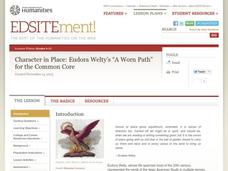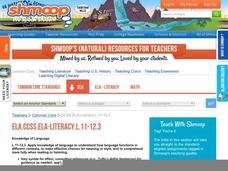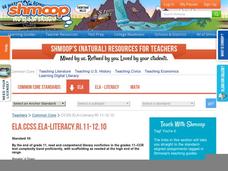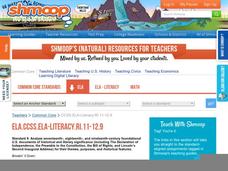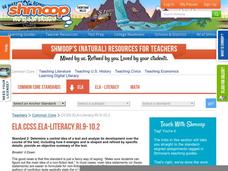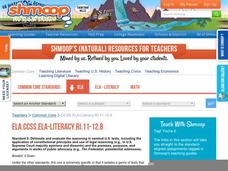New York State Education Department
English Language Arts Examination: June 2015
Many teachers and districts want to give their pupils test-taking practice before state standardized testing occurs. Here's a resource that features a complete exam with numerous passages, a variety of item types, a conversion chart, and...
New York State Education Department
English Language Arts Examination: August 2014
Tired of searching for complex passages suitable for high school level assessments? A challenging examination includes numerous complex text excerpts as well as question items to match them. Learners analyze literary elements, author's...
New York State Education Department
English Language Arts Examination: January 2015
Successful arguing is a learned skill. Pupils read four passages and craft a text-based argument about the return of extinct animals. The resources provides writers with specific guidelines on how to create a well-rounded essay and how...
Curated OER
Commonly Misspelled Words
Display this list of commonly misspelled and frequently confused words for your learners. Though there is no interactive component, this handout is a great reference tool comparing many homophones such as sole and soul. One tip...
Random House
Teacher's Guide: The Hobbit: The Enchanting Prelude to Lord of the Rings
The Odyssey, Star Wars, The Hunger Games. Odysseus, Luke Skywalker, Katniss Everdeen. Add The Hobbit and Bilbo Baggins to these lists, and you have a unit examining classic and contemporary myths, legends, and folktales with hero and...
Curriculum Corner
Valentine Math and Literacy Practice
Looking for math and literacy practice with a Valentine's Day theme? Look no more, because this 43-page packet is filled with practice pages intended to reinforce basic math, reading, and writing skills. From counting to writing words to...
Pulitzer Center
"Voices from Haiti": Using Poetry to Speak up for a Cause
Explore a real world use of poetry with your class! Young language arts pupils consider the concept of advocacy and how journalism, photography, and poetry can raise awareness for a cause. They read several poems about individuals...
August House
The Archer and the Sun
Reinforce reading comprehension with a instructional activity about The Archer and the Sun, a Chinese folktale. Kids learn some background information about Chinese culture before reading the story, and answer literacy questions as they...
EngageNY
Contrasting Two Settings (Chapter 6: "Lost Melones/Cantalouples")
Continue working through Esperanza Rising, by Pam Munoz Ryan, by looking into language choices and discussing text-dependent questions. Pupils converse in small groups and as a class about plot, setting, and figurative language. Using...
EngageNY
Point of View: Comparing Esperanza's and Isabel's Perspectives About Life in the Camp (Chapter 7: "Las Cebollas/Onions")
Explore point of view and more with a Common Core-designed instructional activity. Learners experience different points of view by representing one of two characters from Esperanza Rising during a partner discussion. They must use...
EngageNY
Characters Changing Over Time (Chapter 10: "Las Papas/Potatos")
Engage further in Esperanza Rising with a focus on close reading and metaphor. Class members zero in on the tenth chapter, examining characters and big ideas. Pupils discuss the text in small groups and as a whole class, and participate...
National Humanities Center
Teaching Emily Dickinson: A Common Core Close Reading Seminar
Three of Emily Dickinson's poems, "I like to see it," "Because I could not stop for Death," and "We grow accustomed to the Dark," provide instructors with an opportunity to model for class members how to use close reading strategies to...
National Endowment for the Humanities
Character in Place: Eudora Welty’s “A Worn Path” for the Common Core
How do writers use the interaction between elements like characterization and setting to create meaning? Readers of "A Worn Path" create a series of comic book-style graphics of Eudora Welty's short story and reflect on how Welty uses...
Shmoop
ELA.CCSS.ELA-Literacy.L.11-12.3
Tired of simple sentences? Bored by brief sentences? Plagued by boring sentences? Enrich your life and the writing of your pupils by modeling how to combine sentences to create more varied syntax. Groups then find a number of ways to...
Shmoop
ELA.CCSS.ELA-Literacy.RI.11-12.10
Assess whether your class members can comprehend complex informational text with a series of drills based on selections from Emerson, Thoreau, and G.K. Chesterton. The exercises could also be used for group work or a full-class discussion.
Shmoop
ELA.CCSS.ELA-Literacy.RI.9-10.8
Your learners need to develop skills to argue effectively, and this comes by understanding the traditions that make claims valid, and what detracts from their effectiveness. Although this resource does not give advice on how to teach...
Shmoop
ELA.CCSS.ELA-Literacy.RI.11-12.3
Make analyzing the sequence of events in an informational text easy. Ask readers to craft a one-sentence summary of each paragraph in a document and create a text map. To demonstrate their understanding of the process, participants read...
Shmoop
ELA.CCSS.ELA-Literacy.RI.11-12.9
Guided by close-reading questions, groups examine the similarities and differences between the Declaration of Independence and the Bill of Rights. In addition, they look at how the principles are presented in these two foundational US...
Shmoop
ELA.CCSS.ELA-Literacy.SL.11-12.5
If you allow the space for your class members to be creative with technology as they make a presentation, they will make you proud with their inventiveness. The resource suggests an open research project for which pupils look up...
Schmoop
ELA.CCSS.ELA-Literacy.RI.9-10.2
Although the ideas on how to implement the skill RI.9-10.2 are lacking, the assessment would work well for challenging learners to summarize, and identify the main ideas of presidential speeches that are of similar topics. One could use...
Shmoop
ELA.CCSS.ELA-Literacy.RI.11-12.7
Comparing information found in images, charts, and graphs with that found in written text can be a challenge for even senior high scholars. Provide learners with an opportunity to practice this skill with an exercise that asks them to...
Shmoop
ELA.CCSS.ELA-Literacy.RI.11-12.8
It is no easy feat to wade through legal and political documents. And incorporating this type of informational text into a literature class can also be a challenge. Here’s a resource that includes suggestions for how to address this...
Shmoop
ELA - Literacy.CCSS.ELA-Literacy.RH.9-10.1
Do your pupils know what a primary source is? How about a secondary source? Provide them with the information here about different types of documents and then test their knowledge with a brief quiz. The quiz is made up of two documents....
Shmoop
ELA.CCSS.ELA-Literacy.W.11-12.7
Your pupils are beginning their research project and are having a hard time narrowing their topics down. If you’re not sure how to help them, then start here. Provided is a student dialogue that works though the issues of narrowing a...


